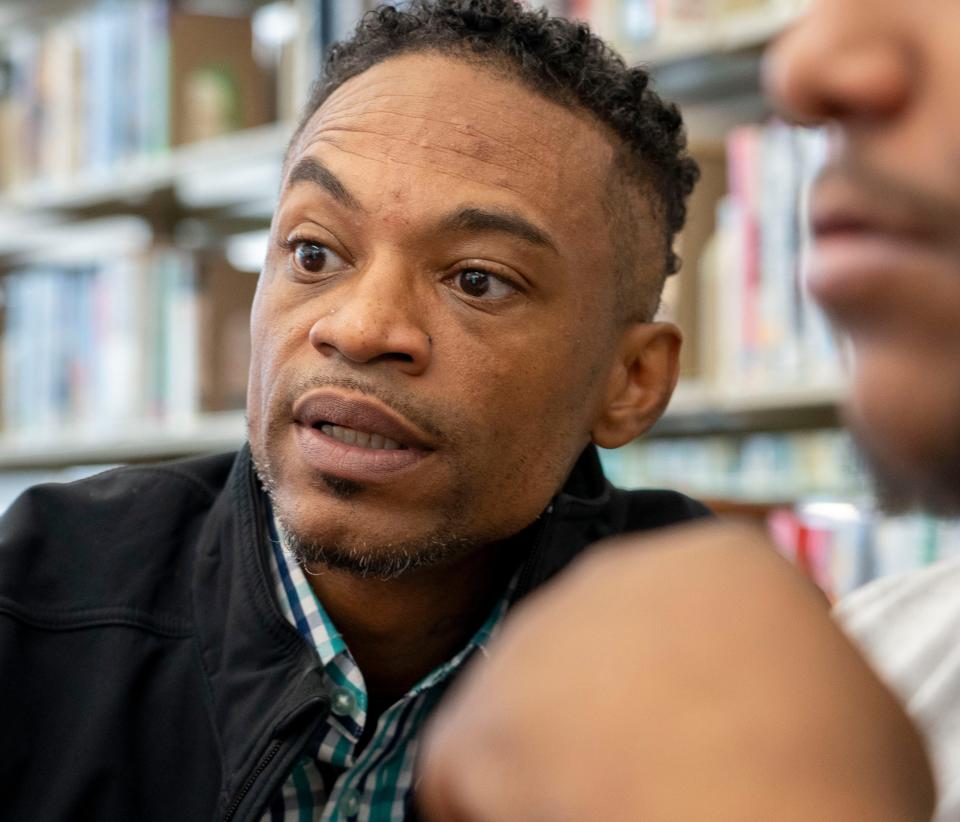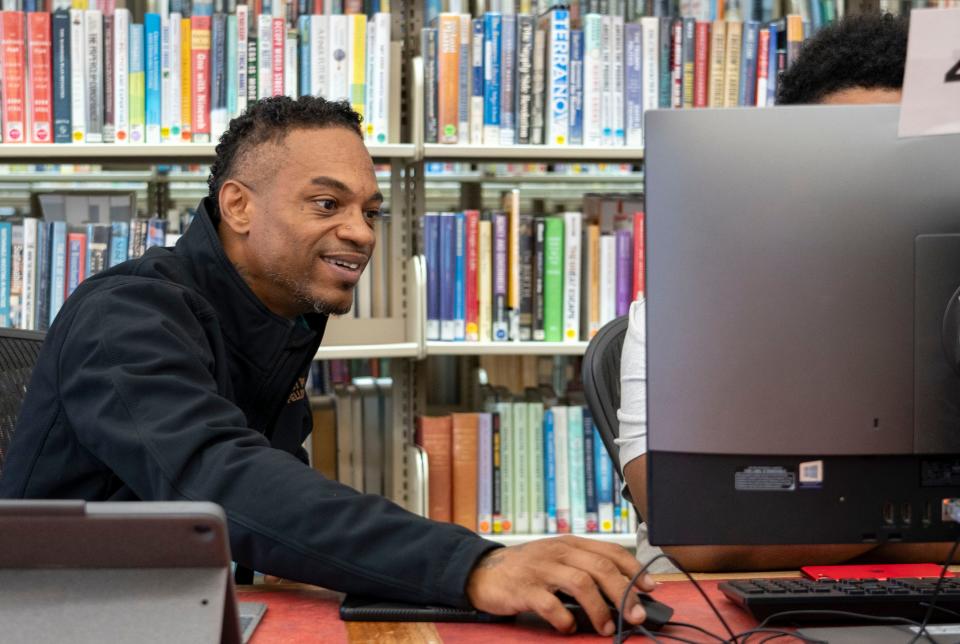Instead of resorting to violence, these people sought help from Indy's Peace Fellowship
- Oops!Something went wrong.Please try again later.
On a cold March night last year, Daniel Mallory, 44, saw how the fine line between violence and peace can hinge on something as simple as having somebody to call for help.
That's the night an acquaintance phoned Mallory because his son had just been kidnapped.
“He was like, ‘Hey, I'm here at this gas station. I went in the store, came out, and my car is gone. My son's in the car,’” Mallory recounted a year later. Mallory rushed over and calmed the man down as responders put out an Amber Alert and got to work. From 10:30 p.m. to 5:30 a.m., he stayed with the man, who was panicking, crying. They found his son by the morning.
“I felt like if he didn’t have that support,” Mallory said, “it probably would have been tough because he’s a violent felon. Who knows what he would have done, but I know it probably wouldn’t have ended good for him.”
Mallory is a life coach in the city’s peacemaker program, known as the Indianapolis Peace Fellowship. Started in January 2022, the program focuses on preventing gun violence rather than reacting to it, coaching rather than policing people at risk of committing violence.
That man he helped at the gas station that night joined the fellowship soon after and is about to graduate.
“We attach ourselves to these individuals,” Mallory said. “Their mind state starts changing, like, ‘I don’t want to do nothing that’s going to lead me back to prison.’”
After starting as a small pilot program funded by Central Indiana Community Foundation in 2021, the fellowship expanded to its current form through $30 million in federal American Rescue Plan Act money granted by Mayor Joe Hogsett's Administration later that year to be spent over three years. The program is slated to receive an additional $4.5 million in the proposed 2024 budget with the goal of making it a permanent part of the city’s budget.

“It looks at the whole person,” Deputy Mayor Lauren Rodriguez said, considering a person’s holistic needs to prevent them from committing violence. The city has police for a reason, she said, but there aren’t enough police to also tackle the root causes of crime. Neither does she think they should be the ones tasked with doing so.
Mayor Joe Hogsett’s Republican challenger in this year’s election, Jefferson Shreve, when asked if he would continue to fund the Fellowship if elected, said he’d support programs that are delivering results. He added that he supports coaching and mentoring programs from Day 1 of an inmate's sentence, reentry programs, and mental health care services.
Indy Peace Fellowship is based off Oakland's Ceasefire program
The aim is to stall the revolving door of incarceration, keep former criminals from reoffending and reduce gun violence in the city.
The program’s genesis was based on a simple but startling fact: that just about 400 people are responsible for a large majority of violent gun crime in a city, Dane Nutty, executive director of the Indy Public Safety Foundation, said. The foundation runs and staffs the fellowship in collaboration with the city’s Office of Public Health and Safety.
In Indianapolis, the number of people who are at the highest risk for being involved in a shooting is very small, the National Institute for Criminal Justice Reform found in a 2020 violence analysis.
That finding led the city to realize what it needed was targeted, intense intervention with that very small cohort of people to steer them away from violence, away from incarceration, into a positive life path.
The guiding principle is that violence is not random, but happens in predictable places, committed by predictable people, triggered by predictable behaviors.
The model is based on a strategy known as Ceasefire pioneered by the National Institute for Criminal Justice Reform in Oakland, Calif., which saw a 46% reduction in homicides from 2012 to 2017. The city contracted with the Institute to conduct the Indianapolis violence analysis in 2019 to 2020 and start something similar.
“On that violence analysis, what we were able to establish is who most likely is the victim and who most likely is the perpetrator,” Shardae Hoskins, lead program manager for the program, said at an Aug. 10 public presentation. “We found out they are the same person. In one instance or another, they just found themselves on one side or the other of that gun."
The fellowship looks for people who meet certain risk factors, including lack of employment and education, previous involvement with gun activity, having had a close friend or relative shot in the last year, association with a violent group, previous criminal charges, being aged 18 to 35 years old and race. The fellowship said that the Indianapolis data shows Black men are especially at risk, but the program has served white and Hispanic men and women as well.
"We're not trying to say, 'You are the problem,'" Rodriguez said. "What we are saying is we don't want you to become a victim, a victim of either losing your life or being swept into the criminal justice system and not being able to get out on your own."
As of Aug. 30, 92 people were enrolled as fellows in the Indy Peace Fellowship.
“This is not a program that's meant to help all 1 million people in Indianapolis,” Nutty said. “We are very targeted on individuals where we can move the needle.”
The program’s leaders and staff said that they believe they are making an impact in reducing gun violence, pointing to the data.
Last year, the first year that the program was operational, Indianapolis saw a 16% drop in the number of people killed in homicides from 2021. That decrease is significant. Nationwide, in 30 cities for which data was available, the number was 5%, according to a report by The Council on Criminal Justice.
There have been 134 criminal homicides and 448 non-fatal shootings in Indianapolis this year as of Sept. 15, which is a 11% and 9% decrease respectively from the same time last year, according to IMPD data provided to IndyStar.
David Muhammad, executive director of the Institute, credits the reduction with the work of the Peace Fellowship.
Who are the Indianapolis peacemakers?
There are three kinds of peacemakers who work full-time in the program: Life coaches, like Mallory, outreach workers and violence interrupters.
Life coaches help fellows with everything from finding a job to securing permanent housing — a feat, as many apartment managers reject applicants with a criminal history. They may help them get a driver’s license, get their felonies expunged, study for a GED, or take steps to start their own business. Fellows receive mental health and addiction treatment, such as cognitive behavioral therapy.
In all, 18 life coaches each work with six to seven fellows over an approximately 18-month period. Coaches sometimes have their own criminal histories, which they draw upon to coach with empathy.
“Who better to help high-risk individuals than a person who was once a high-risk individual?” Mallory said. He himself spent a total of 15 and a half years in prison before being released for the last time in 2018.
He knows first-hand the hard uphill scramble of getting your life together after being released. He didn’t have food in his house. He didn’t have clothing. He didn’t know how to pull his health records.
“I know how it feels to come home and not have resources, to feel destitute, to feel hopeless, to not know where to grab these resources,” he said.
The hardest part is that it takes time to build trust, especially with someone who has never had somebody care about them so deeply and consistently before, Mallory said.
“For all they know is that you could be a wolf in sheep’s clothing,” Mallory said. “Until they really see your genuineness and that you have the ability to help and that you can stay consistent with them.”

Whether it’s spending a couple hours on PlayStation together, picking them up to go to the gym, or taking them and their children to Chuck E. Cheese, Mallory finds unique ways to build trust and genuine friendship with his fellows. Over time, he said, fellows will open up and talk about their problems.
Not everyone is receptive to getting help, he said. One man who approached Mallory asking to be a part of the fellowship last year had fallen deep in drug addiction. Mallory tried to get him into a seven-day rehabilitation program. The man was becoming open to the idea. But he was too far gone, Mallory said. He died of an overdose before his November birthday.
“I did blame myself at first, but then I had to realize like, hey, that's not my fault,” Mallory said. “I tried to do as much as I could, for however long as I could have, but at the end of the day, these guys make their own decisions.”
There are success stories. One man Mallory works with was formerly incarcerated with him. Mallory said the man became inspired to join the fellowship after seeing how Mallory rebuilt his life. He now works two jobs and has kept out of trouble, Mallory said.
The second type of peacemaker are outreach workers. These 26 people are the first line of contact with potential fellows. Using just a name and a phone number, Hoskins explained, they find people to get them to join. They also work throughout the city with community organizations to provide support.
Luis Guerra, 33, works particularly with youth at risk as an outreach worker. He is mentoring a teenager who had anger problems, counselling him to learn discipline and put his energy into a mixed martial arts class run by New Boy, an organization that is one of the recipients of the city’s $45 million city’s violence reduction grant program, known as the Elevation Grants.
“Resources, we know they're out there, but a lot of people don't know where to find them and we are kind of like that connection to that,” Guerra said. “We fill in a gap.”
The third type of peacemaker are violence interrupters.
Since the program started, the 14-person team of violence interrupters have intervened in 1,094 conflicts, as of Sept. 7. The work varies from deescalating conflicts between people that often erupt on social media to breaking up fights at community events.
Mallory used to wake up in the morning and feel a 600-pound brick of anxiety on his chest. Since he started this work, it’s gone.
“I feel more secure in my career and more secure in my personal life knowing that I'm a significant part of helping make a difference,” Mallory said. “So that's what I do it for, to show that fellas can change.”
Contact IndyStar reporter Ko Lyn Cheang at kcheang@indystar.com or 317-903-7071. Follow her on Twitter: @kolyn_cheang.
This article originally appeared on Indianapolis Star: Indianapolis violent gun crime: Peace Fellowship coaches those at risk

